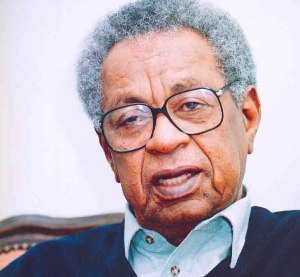FEATURE-Sudan writer says West should read more Arab books
CAIRO, April 11 (Reuters) — Sudanese novelist Tayeb Saleh says a dearth of translated Arabic literature has reinforced Western prejudices against Arabs and wider reading of Arab fiction abroad would reduce “sheer ignorance” of the region.
 Arab literature has won little recognition overseas, but Saleh defends it from criticism of being limited and dominated by religion.
Arab literature has won little recognition overseas, but Saleh defends it from criticism of being limited and dominated by religion.
He says the Arabic novel has as much to offer as the literature of Latin America, which has produced a batch of internationally acclaimed writers in recent decades.
Arab writers unread
Saleh’s Season of Migration to the North, written in 1966, has been translated and printed by mainstream Western publishers. But he says publishers in English have been unwilling to give most Arab writers a real chance.
“If you find a publisher who believes in Arab literature and takes a risk on it, not just publishing a few thousand books, you will find readers for it,” said the 76-year-old writer, who is married to a Scot and has lived much of his life in England.
“The Arab novel has reached a very high standard which is comparable to any standard, anywhere in the world. The fact that this is not recognised abroad is a matter either of criteria … or it is a lack of enthusiasm for foreign products,” he said.
Egypt’s Naguib Mahfouz in 1988 became the only Arab writer to win the Nobel literature prize.
Colonialism
Seasons of Migration to the North, published in translation in the 1970s and considered a modern Arabic classic, tells the story of Mustafa Saeed, a Sudanese man who while living in England exploits his exotic image to seduce women.
He murders one of them in what readers have interpreted as an act of revenge for British imperialism in Sudan.
“This novel was written in the sixties and the question of colonialism was still fresh in people’s minds,” Saleh said.
“Unfortunately the basic misunderstandings seem to still exist, but in different forms. The centre of gravity has shifted
from Europe to the United States,” he said.
Terms of reference
The lack of Arab literature translated over the decades has not helped to further public understanding of the Arab and Muslim world in the West, says Saleh, who left Sudan in 1953 to work for the BBC Arabic service in London.
Saleh: No emptiness or aridity in
Arab world’s field of culture
“The Arabs and the Muslims have become ‘the other’, the unknown quantity,” he said. “People make such dreadful assumptions and mistakes about the Arabs out of sheer ignorance. I wouldn’t say malice, but it is ignorance.
“When there is a political crisis, people jump to the wrong conclusions because they have no terms of reference,” he said.
Saleh, who still lives in London, was in Cairo to pick up an Egyptian state literature prize for his work.
Arab cultural diversity
“From Mauritania to Oman, you will find there are many cultural festivals happening,” he said. “I don’t think there is emptiness or aridity in the field of culture in the Arab world.”
A UN report on Arab human development in 2002 said there was “a severe shortage” of Arab writing. It said a large part of the Arab market was made up of religious and educational books of limited creative content.
It also criticised limited translation of foreign books into Arabic.
The number of books published regionally shows that Arabs, who number more than 280 million, read very little. A book which sells 5000 to 10,000 copies is considered a bestseller in a region where illiteracy is widespread.
